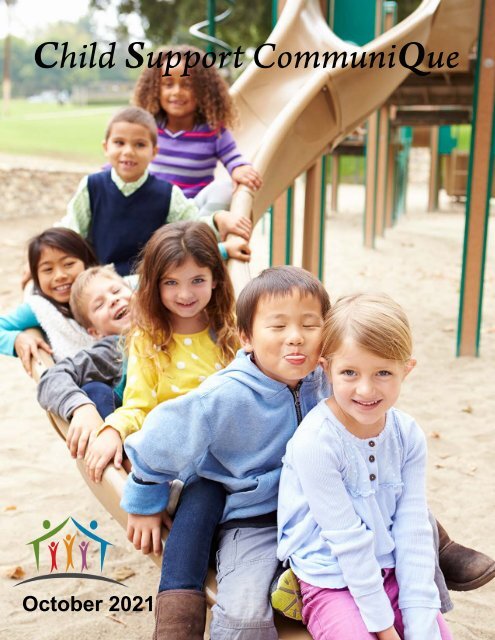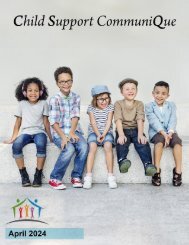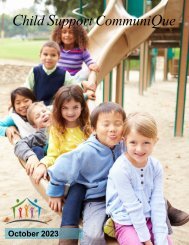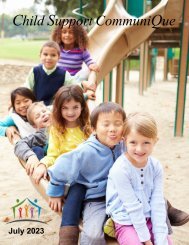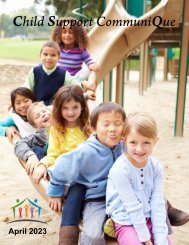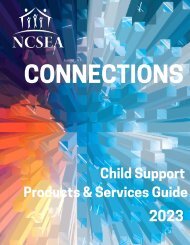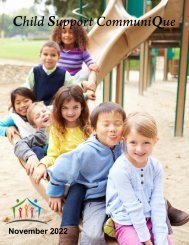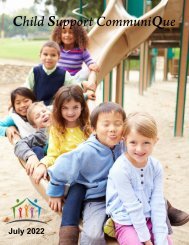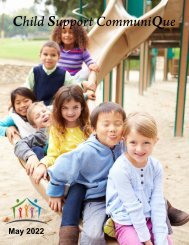October 2021 CSQ
You also want an ePaper? Increase the reach of your titles
YUMPU automatically turns print PDFs into web optimized ePapers that Google loves.
ChildSupportCommuniQue
Table of Contents<br />
<strong>October</strong> <strong>2021</strong><br />
President’s Message…………………………………………….…………….….…..3<br />
Community Corner: Absence Makes the Heart Grow Fonder….........................5<br />
NCSEA Responds to Strengthing Families for Success Legislation………........8<br />
Collaboration is Key……………………………………..………….……………….14<br />
Tribal Child Support Legislation Moves Through the Senate …………………..17<br />
Workplace Tools for Responding to a Mental Health Crisis…………………….21<br />
Evolving Child Support Awareness into the Future………………………………28<br />
<strong>2021</strong> Leadership Symposium Wrap-Up…………………….….………………….31<br />
NCSEA U Spotlight………………………………………………………………….35
Lori Bengston<br />
NCSEA President<br />
Greetings! It is an honor and a privilege to serve as this<br />
year’s NCSEA president! To say I have big shoes to fill is<br />
an understatement, following my friend Lisa Skenandore.<br />
Lisa not only handled the business of NCSEA with passion<br />
and energy, but also had the extra challenge of navigating<br />
us through a pandemic. I hoped navigating the pandemic would not carry<br />
over to this year, but I fear we may be facing those challenges a bit longer.<br />
With the passing of the gavel, Lisa assured me she will continue to support<br />
NCSEA and me as we move into a new program year.<br />
In my previous role as president-elect, I was fortunate to sit in on many<br />
committee calls, and learned so much from those encounters. One of the<br />
key takeaways was that we all come from various backgrounds and<br />
experiences, and how we move forward impacts each of our programs in a<br />
variety of ways. I am grateful for the lively conversations! While at times not<br />
everyone agrees, in the end all views are considered, and we come away<br />
with a direction that benefits the child support program as a whole. I believe<br />
in our vision that NCSEA is the voice of the child support community, and I<br />
admire the passion that is evident as we not only share our voice, but also<br />
listen to the voices of others to promote the best outcomes for the families<br />
we serve. My goal this year is to embrace those differences to make us a<br />
stronger organization and ultimately, a stronger program.<br />
As I begin my new role, one of the first and arguably most important jobs of<br />
the NCSEA president is selecting committee chairs. The response to the<br />
call for volunteers was outstanding. Every time I reached out for committee<br />
assignments, I received a warm and enthusiastic “YES”! The volunteer<br />
spirit is alive and well in this organization and it is truly amazing to see all of<br />
the work done at the committee level each year. This year will be no<br />
exception. The Policy and Government Relations Committee (PGR) will<br />
continue monitoring new and pending legislation and advocating for<br />
effective program policy. There is a lot happening right now and the PGR
committee work never really stops but flows from one year to the next as<br />
they stay abreast of what is happening legislatively. The finalization of<br />
NCSEA’s strategic plan will set the stage for the work of all committees<br />
going forward. The final steps include charging the appropriate committees<br />
with carrying out the initiatives in the plan. It will be another busy year, and<br />
as we kick off committee meetings, I am confident we have the right people<br />
in place to get the job done!<br />
I am especially excited to announce that we plan to move forward with two<br />
in-person conferences: the Policy Forum February 3-5 in Washington, D.C.,<br />
and the Leadership Symposium August 7-10 in Charlotte, North Carolina.<br />
Work is already underway for the Policy Forum under the leadership of cochairs<br />
Margot Bean and Connie Chesnik. The theme for this year’s Policy<br />
Forum is “Focusing on our Vision – Recognizing our Various Perspectives”<br />
and will offer an abundance of interesting, timely and thought-provoking<br />
topics. Watch for registration information in late <strong>October</strong>. Please be<br />
assured that NCSEA will continue to monitor all safety protocols to ensure<br />
the well-being of those who attend and will communicate every step of the<br />
way.<br />
I hope you will take advantage of as many learning opportunities as you<br />
can this year. In addition to our conferences, NCSEA provides Web-Talks,<br />
Idea Exchanges, and NCSEA Connects, as well as the quarterly Child<br />
Support CommuniQué (<strong>CSQ</strong>) journal and weekly Rapid Read. If you would<br />
like to receive more information, please reach out to me or to NCSEA staff,<br />
Ann Marie Ruskin or Gillyn Croog.<br />
I look forward to the year ahead as we work together to promote and<br />
influence child support policy, as well as to educate, connect, and inspire<br />
those who work in the child support program.<br />
Print article here<br />
_________________________________________<br />
In addition to serving as NCSEA President, Lori Bengston is a Project Manager for<br />
Young Williams and has been active in the child support enforcement program for over<br />
16 years. She has direct supervision of the Nebraska Child Support Call Center,<br />
including the Early Intervention Project. Lori has been a speaker at many child support<br />
conferences on the topics of customer service, call centers, and early intervention. Lori<br />
has been active in NCSEA for many years, previously serving on the Board from 2007-<br />
2013. She is a Past President of the Western Intergovernmental Child Support<br />
Engagement Council (WICSEC) and the Nebraska Child Support Enforcement<br />
Association Board of Directors.
Absence Makes the Heart Grow Fonder<br />
by James C. Fleming, North Dakota DHS/CSE<br />
528 days. That is how long it had been from the end of the<br />
last in-person national child support conference (NCSEA<br />
Policy Forum 2020) to the opening of the <strong>2021</strong> annual<br />
meeting and conference of the National Council of Child<br />
Support Directors (NCCSD) on July 20. For a group used to<br />
getting together five or six times a year, 528 days is a LONG<br />
time to wait to see such good friends and colleagues.<br />
Many attendees mentioned that the NCCSD conference felt like a family<br />
reunion, except with folks you LIKE to spend time with. That would<br />
probably be true regardless of the conference location, but it didn’t hurt the<br />
mood of the conference that it was held in such a relaxed and scenic<br />
location as Medora, North Dakota in the summertime. And with an equally<br />
relaxed dress code.<br />
The relief of returning to in-person conferences was not just about a break<br />
in the monotony of telework and virtual meetings. It was also confirmation<br />
of the good will and common interest that is shared by child support leaders<br />
in both the government and private sectors. Turnout was smaller among<br />
federal and state participants due to travel restrictions, but there was<br />
unprecedented attendance from the private sector in terms of the total<br />
number attending and the number of companies represented. How exciting<br />
to see new interest in child support service delivery!<br />
With over half of the state directors not able to attend or send a designee, a<br />
new challenge faced by NCCSD was coming up with a way to support<br />
virtual presenters and attendees. NCCSD was very lucky to find a local<br />
audio-video company who made the transition from on-site to virtual<br />
presenters look nearly seamless. Video conferencing sure seems to have
come a long way since the beginning of the pandemic. The option of<br />
presenting virtually also helped a lot in recruiting speakers for a given topic.<br />
It is ironic that we are having difficulty meeting in person at a time when our<br />
training conferences are needed the most. The pandemic continues to<br />
prompt the child support community to re-evaluate nearly everything we do,<br />
even things like distribution that may have been dormant since enactment<br />
of the Deficit Reduction Act of 2005. The discussion at NCCSD and other<br />
similar conferences is extremely valuable when considering how we<br />
change the program moving forward.<br />
One of the frequent discussion<br />
topics for the “Rushmore” group<br />
of association presidents is the<br />
future of virtual attendance at<br />
national conferences. On one<br />
hand, a virtual option greatly<br />
expands the number of child<br />
support professionals who can<br />
participate, which is one of the<br />
main reasons we exist as organizations. Attending virtually is a lot cheaper<br />
in the long run than traveling to attend in person. On the other hand, as<br />
with the increased use of telework in our company or agency, collaborating<br />
remotely lacks an aspect of human connection. Virtual meetings are fine to<br />
a point, but are not a complete substitute for sitting face to face with a new<br />
friend and colleague from another company or agency and brainstorming<br />
how we can do things better. What kind of in-person attendance can we<br />
expect in the future if virtual attendance becomes a permanent option?<br />
Unfortunately, the prevalence of the Delta variant of COVID-19 may once<br />
again cause conferences to change to virtual only, and the <strong>2021</strong> meeting in<br />
Medora may be a brief window in time to see each other in person for a few<br />
more months. I hope we don’t have to wait another year or more to see<br />
each other again, but at least we had Medora.<br />
James C. Fleming is the director of the Child Support Division of the North Dakota<br />
Department of Human Services, Immediate Past President of the National Council of
Child Support Directors (NCCSD), President-Elect of the National Child Support<br />
Enforcement Association (NCSEA), and member of the Board of Directors for the<br />
Western Intergovernmental Child Support Engagement Council (WICSEC). Jim is a<br />
member and former co-chair of NCSEA’s Policy and Government Relations Committee<br />
and NCCSD’s Policy and Practice Committee, and a member of the editorial committee<br />
for the NCSEA Child Support CommuniQue. Jim also chairs NCCSD’s Employer<br />
Collaboration Workgroup.<br />
A second-generation attorney, Jim earned his Bachelor of Arts degree from the<br />
University of North Dakota and his Juris Doctorate from Notre Dame Law School. He<br />
has been an assistant attorney general for North Dakota for 27 years, following a<br />
clerkship with the North Dakota Supreme Court.<br />
Print article here<br />
Save the Date – Registration opens soon!
NCSEA’s Congressional Letter to<br />
Improve the Strengthening Families for<br />
Success Act<br />
by Diane Potts, Public Knowledge<br />
NCSEA PGR Committee Co-chair<br />
Introduced last year in both the Senate (S. 4844) and House (H.R. 8704),<br />
the Strengthening Families for Success Act (SFSA 2020) proposed<br />
sweeping changes to the child support program. The most significant<br />
change would phase out Title IV-A cost recovery and require states to<br />
pass-through all collected current support and arrearage payments to<br />
families who currently and formerly received TANF. In addition, SFSA 2020<br />
would have required states to disregard current support collected in<br />
determining a family’s TANF eligibility and benefit levels. Other sections of<br />
SFSA 2020 proposed further impactful changes to the child support and<br />
foster care programs.<br />
Work by the Policy & Government Relations Committee<br />
Immediately after SFSA 2020 was introduced, NCSEA’s Policy and<br />
Government Relations Committee (PGR) began its work to examine and<br />
understand all the key provisions and their impact. PGR divided the work,<br />
with one group focusing on the changes to TANF cost recovery and<br />
another studying the Title IV-E foster care provisions. The last group looked<br />
at SFSA 2020’s ban on the recovery of Medicaid costs for births.<br />
Each group developed a paper with key information that informed PGR’s<br />
extensive discussions on recommendations. After months of work, PGR<br />
presented its preliminary recommendations to the NCSEA Board and the<br />
Directors provided their feedback. On August 1, <strong>2021</strong>, the Board approved<br />
the letter to Congress on SFSA 2020 [found here]. While it voiced support<br />
for many of the provisions, NCSEA urged the sponsors of SFSA 2020<br />
(Senators Wyden and Van Hollen and Representative Davis) to make key<br />
changes before reintroducing the legislation later this year.
Title IV-A Cost Recovery<br />
SFSA 2020 proposed that, effective <strong>October</strong> 1, 2023, states would be<br />
required to pay all of the current support and arrearage payments collected<br />
by the state on behalf of a TANF family to the TANF family. In addition,<br />
states would be required to disregard the current support amount for<br />
purposes of determining Title IV-A eligibility and the amount and type of<br />
assistance. For former TANF families, states would be required effective<br />
<strong>October</strong> 1, 2025, to pay all of the current support and arrearage payments<br />
collected by the state to the former TANF family and to treat the amounts<br />
collected pursuant to an assignment as if the amounts had never been<br />
assigned. Recognizing that states will need to undergo significant system<br />
changes to effectuate these requirements, SFSA 2020 provided for 90%<br />
federal financial participation (FFP) for expenditures related to the planning,<br />
design, development, installation, or enhancement of a system for federal<br />
fiscal years 2022 and 2023.<br />
In addressing these monumental proposed changes to the child support<br />
program, NCSEA first acknowledged the benefit of expanded state passthrough<br />
and disregard<br />
policies to families and<br />
programs. Passed-through<br />
support helps families<br />
become economically selfsufficient<br />
more quickly and<br />
“However, states should have the option,<br />
as opposed to a mandate, to eliminate<br />
TANF cost recovery from their programs”<br />
permanently. State child support programs benefit from pass-through and<br />
distribution policies that are more closely aligned with the mission of<br />
promoting familial self-sufficiency, and eliminating cost recovery would<br />
vastly simplify program administration.<br />
However, states should have the option, as opposed to a mandate, to<br />
eliminate TANF cost recovery from their programs. NCSEA explained that<br />
a federal mandate would have widely varying impacts across states given<br />
the diversity of their child support program funding structures as well as<br />
TANF and child support policies. Because many states use retained<br />
collections as a source of state funding for their child support program and<br />
draw federal matching funds that triple the value of the recoveries, there is
a significant fiscal impact at stake that could harm the child support<br />
program and the millions of families it serves.<br />
NCSEA also pointed out that there is wide variation in the extent to which<br />
states have acted on existing pass-through and disregard options currently<br />
in federal law. As of May 2020, half of states, as well as the District of<br />
Columbia and Puerto Rico, pass through some or all child support without<br />
reducing the family’s cash assistance grant.<br />
And under the TANF block grant, states have<br />
wide latitude to set TANF income criteria and<br />
benefits levels. A state option allows states<br />
discretion to develop a pass-through and<br />
disregard policy that is congruent with its TANF<br />
program.<br />
NCSEA urged additional funding to support those states choosing to pass<br />
through all collected current support and arrearage payments. Although<br />
SFSA did contain some fiscal relief to states, namely 1) forgoing the federal<br />
share of retained collections and 2) temporarily increasing to 90 percent<br />
FFP on states’ costs to adapt their systems for the changes in distribution,<br />
more financial incentives will allow most states to move forward out of cost<br />
recovery. The incentives could include:<br />
• Backfilling the loss of state IV-A recoveries to help states manage<br />
the negative revenue impact on state child support programs and<br />
state services<br />
• Increasing federal child support performance incentive funding<br />
• Allowing states to pilot expanded pass-through and disregard<br />
policies and to defray the loss of state-retained collections with<br />
Section 1115 waivers<br />
• Expanding allowable IV-D program expenditures to include<br />
employment services for parents who owe support<br />
Finally, NCSEA asked that states have the option to maintain distribution<br />
provided by the Personal Responsibility and Work Opportunity<br />
Reconciliation Act of 1996 (PRWORA distribution). In SFSA 2020, states<br />
were required to distribute support in accordance with the Deficit Reduction<br />
Act (DRA) of 2005, which would mean that 49 of the 54 states and<br />
territories that currently use PRWORA distribution would have had to<br />
implement a new distribution method. While DRA distribution is more<br />
advantageous to families because federal income tax refund intercepts go
to the family instead of state assigned arrears, NCSEA urged that the<br />
method of distribution under PRWORA remain a state option due to the<br />
enormous impact the change would have on almost every state.<br />
Foster Care Referrals<br />
SFSA 2020 also contained proposed changes to cost recovery for foster<br />
care. Instead of using current support collected to reimburse the cost of<br />
foster care, the support would either be paid to the foster parent or kinship<br />
caregiver, or deposited into a savings account to be used for the child’s<br />
future needs in the event of reunification with the family, including<br />
reunification services. Collections on arrears would be deposited into a<br />
savings account for the child’s future needs.<br />
NCSEA expressed support for the inclusion of foster care provisions and<br />
asked that they be expanded to align with NCSEA’s recent resolution on<br />
foster care referrals. That resolution recognized that some studies have<br />
found that child support orders may actually prolong the period of time a<br />
child spends in a foster care placement and add to, rather than recoup,<br />
program costs. NCSEA also explained that many foster care referrals are<br />
not cost effective, particularly against a struggling intact family or a former<br />
custodial parent (“removal parent”) with whom reunification is planned.<br />
Eliminating referrals from removal parents seeking reunification helps to<br />
keep financial resources in the home and is consistent with the draft<br />
legislation’s aim to reduce the recovery mission of the child support<br />
program.<br />
NCSEA urged the bill sponsors to provide in the<br />
reintroduced legislation that foster care referrals<br />
from the Title IV-E program to the Title IV-D child<br />
support program be guided by the best interests<br />
of the child. Under that standard, there will be<br />
fewer referrals or closure of cases against<br />
removal parents or in cases where both parents<br />
reside together.<br />
Although the authority to make referrals selectively already exists at the<br />
state level, it would benefit programs and families to include this authority in<br />
the new legislation. If reunification stops becoming a realistic goal for the<br />
family, the child welfare agency can consider referring the case to the child<br />
support program.
NCSEA also weighed in on SFSA 2020’s proposal for a foster care study<br />
and report by the Government Accountability Office (GAO), and suggested<br />
that the study would be more productive if conducted by a joint federalstate<br />
workgroup of representatives from the IV-E and IV-D programs. This<br />
joint federal-state workgroup of subject matter experts could develop badly<br />
needed recommendations on referral criteria (in more depth than<br />
addressed here), the desirability and feasibility of child savings accounts,<br />
data sharing, and other issues concerning the most effective means of<br />
coordinating between the IV-D and IV-E programs. Such an approach<br />
would still yield an informative and much-needed policy- and procedurallyoriented<br />
report, but would also leverage the existing expertise of program<br />
professionals at the federal and state levels. After recommendations are<br />
implemented, it may be desirable at that point to have a GAO study to<br />
assess the implementation status and effectiveness of the recommended<br />
changes.<br />
Finally, NCSEA also suggests that consideration of child saving accounts<br />
be assigned to the workgroup for further analysis. As with TANF cost<br />
recovery, NCSEA strongly supports states examining retained collections in<br />
foster care cases. However, while depositing collected child support into a<br />
savings account for a child in foster care could benefit the child long-term, it<br />
also creates several challenges. These include ownership of the account,<br />
accrual of interest, income tax responsibilities for the account holder or<br />
child, and potential implications of turning over potentially large sums of<br />
money to a child at the age of 18. If the workgroup looks at and addresses<br />
those issues and recommends child savings accounts for collected support,<br />
the creation and management of these savings accounts for children<br />
receiving services should be placed with the IV-E program and not the IV-D<br />
program.<br />
Medicaid Birth Costs<br />
Current law allows states to recover birth<br />
expenses paid by Medicaid through child<br />
support obligations, which reduces the support<br />
provided to children and families. SFSA 2020<br />
would ban Medicaid-cost recovery for births<br />
beginning in federal fiscal year 2026 and would<br />
provide an option for states to implement<br />
earlier.
Although NCSEA typically does not support mandates on state child<br />
support programs, it supported SFSA 2020’s ban on the recovery of<br />
Medicaid costs for births. Forty-eight states have shifted away from and no<br />
longer recover Medicaid birth costs through the IV-D program, while the<br />
two that still do have seen a 35%-38% decline in the amount of recovery<br />
since 2011. In these two states, eliminating the practice will have negative<br />
budget impacts to both the Medicaid program ($12-$14M annually) and the<br />
child support program. However, the amount recovered by the child support<br />
program is a small fraction of the millions paid out by Medicaid in birth<br />
costs each year.<br />
NCSEA recognizes that recovery of Medicaid costs associated with the<br />
birth of a child disproportionally affects low-income families and takes<br />
money away from the children in those families. Instead of recouping<br />
government costs, the primary purpose of the child support program should<br />
be to work towards reliable, consistent financial support for children.<br />
Conclusion<br />
The bill’s sponsors have indicated that a bill similar to SFSA 2020 will be<br />
reintroduced in <strong>2021</strong>. NCSEA is hopeful that its advocacy efforts will result<br />
in better legislation for the child support program and families. Many thanks<br />
to the 2020-<strong>2021</strong> PGR Committee for their work on the letter and PGR:<br />
Tish Keahna Kruzan, Lara Webb Fors, Paul Gehm, Michele Ahern,<br />
Elizabeth Morgan, Jane Venohr, Jolie Sheppick, Kate Cooper Richardson,<br />
Amy Roehrenbeck, Connie Chesnik, Jim Fleming, Mary Johnson, Lisa<br />
Skenandore, Margot Bean, Nicholas Palos, Kay Farley, Erin Frisch, Robbie<br />
Endris, and Lori Bengston.<br />
_______________________________________<br />
Diane Potts is the Vice President of Child Support and Workforce Services at Public<br />
Knowledge®, a national consulting firm that recently merged with the Center for the<br />
Support of Families (CSF), a Division of SLI Government Solutions. Diane is a Past-<br />
President of NCSEA, its past Secretary, and an Honorary Lifetime Member. She served<br />
on NCSEA’s Board of Directors from 2013-2019, and as co-chair of the Policy Forum in<br />
2015, 2016, and 2019. She currently is the co-chair of the Policy and Government<br />
Relations Committee and a frequent presenter for NCSEA at both its Policy Forum and<br />
Leadership Symposium, as well as NCSEA webinars and Idea Exchanges.<br />
Print article here
Collaboration is Key!<br />
by Corrinne Flores, ADP, Inc.<br />
Collaboration is key when stakeholders work together to make a program<br />
or process a success! The National Council of Child Support Directors<br />
(NCCSD) Employer Collaboration Workgroup is a great example of<br />
collaboration and partnership between the employer community and the<br />
child support program. NCCSD established the first workgroup in 2018 to<br />
improve lump sum reporting and withholding. Workgroup members<br />
included state child support agency directors or their designees, members<br />
of the American Payroll Association, representatives from many of the<br />
nation’s largest employers, and the federal Office of Child Support<br />
Enforcement’s (OCSE) Employer Services Team. The workgroup<br />
successfully drafted model legislation that states can adopt to address<br />
lump sum reporting and withholding and addressed standardizing<br />
timeframes for employer reporting and state responses. In states with<br />
existing mandatory lump sum reporting laws, provisions in the model<br />
legislation may be used to create or update regulations and/or guidelines.<br />
Drafting the model legislation resulted in both employers and child support<br />
agencies seeing the process from a different perspective, including<br />
identifying challenges and recommending solutions.<br />
In addition to drafting model legislation, the workgroup recommended<br />
enhancements to OCSE’s portal for lump sum reporting. OCSE acted on<br />
these recommendations, and now employers receive a match notification<br />
when they report employees who are eligible to receive a lump sum<br />
payment. In the fall of <strong>2021</strong>, Communication Center will be available on the<br />
OCSE portal to facilitate secure message and document exchange<br />
between employers and child support agencies and OCSE staff.<br />
Based on the success of the Employer Lump Sum Collaboration<br />
Workgroup, attendees of the 2019 Employer Symposium recommended<br />
establishing another workgroup to address ways to improve overall<br />
processes between child support agencies and employers. In December
2019, NCCSD established the Employer Collaboration Workgroup to<br />
identify tasks and develop a strategy to accomplish those tasks, to improve<br />
shared employer and child support agency processes to establish and<br />
enforce child support orders. Since 2020, workgroup activities include:<br />
• discussing potential changes to the Income Withholding for Support<br />
Order form to be considered during the next Office of Management and<br />
Budget (OMB) renewal in 2023, such as reducing the number of identifiers<br />
on the form<br />
• reviewing mock-ups for the upcoming Communication Center on<br />
OCSE’s portal<br />
• gathering information about automating the electronic National<br />
Medical Support Notice (e-NMSN) and providing periodic updates<br />
• developing a standard response to verification of employment (VOE)<br />
requests<br />
• conceptualizing a national employer database<br />
The workgroup spent a significant amount of<br />
time on improving the VOE process by working<br />
together to develop a standard response to<br />
child support agency requests. While<br />
recognizing that states have some different<br />
VOE response requirements, the workgroup’s<br />
first step was to identify the information that<br />
states need to establish and modify orders.<br />
Nearly all child support agencies have agreed to accept the standard VOE<br />
response developed by the workgroup. This means when employers<br />
receive a VOE request, they can return the standard VOE response.<br />
Employers’ ability to provide a standard VOE allows for automation in<br />
responding to the requests, resulting in states receiving timely responses at<br />
higher volumes.<br />
These are all examples of employers working with the child support<br />
community to understand different perspectives, capabilities, and<br />
limitations, and using that information to create efficiencies and processes<br />
that benefit all stakeholders and ultimately ensure children and families<br />
receive child support.<br />
Corri Flores is the Director of Government Affairs for ADP, LLC. Corri manages the<br />
relationships between ADP and Wage Garnishments agencies to gather information<br />
and cultivate positive relationships. She has been with ADP for over twenty-six years
and has spent much of her career within the Agency Relations organization. She has<br />
participated on the American Payroll Association’s Government Relations Task Force<br />
(GRTF) for Child Support and Wage Garnishments workgroups for the past eight years<br />
and is the current Chair of both the GRTF Child Support and Garnishment workgroups.<br />
She is a member of the National Child Support Enforcement Association and currently<br />
serves on its Board of Directors.<br />
Print article here
A Decade in the Making: Tribal Child<br />
Support Legislation Moves Through<br />
the Senate<br />
The Tribal Child Support Enforcement Act passed the Senate on<br />
July 13th, <strong>2021</strong> by unanimous consent<br />
by Lisa Skenandore, Vice President, SMI<br />
After more than a decade of hard work and consistent advocacy by the<br />
tribal child support community, critical legislation for the tribal child support<br />
program has been passed unanimously by the United States Senate. This<br />
legislation—perhaps most importantly—grants the tribal child support<br />
program access to the Federal Tax Refund Offset Program (FTROP).<br />
When the tribal child support program was first authorized by the passage<br />
of the Personal Responsibility and Work Opportunity Reconciliation Act of<br />
1996, tribes were not given access to the Offset Program. In that same<br />
year, existing state child support programs were authorized to use FTROP<br />
by the Debt Collection Improvement Act and Executive Order 13019,<br />
neither of which provided FTROP access to the tribes. These missed<br />
opportunities to include the tribes in an effective collection program created<br />
a significant service barrier for the tribes.<br />
The journey to change this issue began in 2010 when I was then president<br />
of the National Association of Tribal Child Support Directors. During one of<br />
our biannual meetings, staff from both the Office of Child Support<br />
Enforcement (OCSE) and the Internal Revenue Service (IRS) Office of<br />
Safeguards were present and shared the work and discussions, explaining<br />
how we came to this point. Ultimately, they encouraged us to take a strong<br />
advocacy position and work on the needed fix. Both agencies<br />
acknowledged that they could not in their capacity assist us with advocacy,<br />
and in order for the tribes to access the offset program or data share with<br />
our state counterparts, a change in legislation was necessary. This should<br />
be simple, right? One would think so; however, we soon found that it was<br />
more complicated because a legislative change would affect both the<br />
Social Security Act and the Internal Revenue Code. This was a double-
edged sword that most did not want to tackle for fear that it could open the<br />
door to other unanticipated changes in either the Act or the Code.<br />
Despite these challenges, we knew we had to persevere. Seeking the<br />
legislative change would not only provide parity to the tribes in enforcement<br />
resources, but also remedy another issue concerning the tribes’ use of<br />
state child support case management systems. Many of the tribal<br />
programs, including my own, use the states’ automated systems. During<br />
the states’ triennial IRS audits, it was determined that tribal child support<br />
programs were not permitted access to IRS data, although they were (and<br />
still are) subject to the same rules and regulations of IRS Publication 1075.<br />
As a result of that audit, states were issued findings related to tribal access<br />
to their state systems.<br />
Fortunately, most findings were<br />
held in abeyance, as the IRS<br />
recognized that a larger solution<br />
was needed, and ultimately the<br />
states were not at fault. As a<br />
temporary fix, the Office of<br />
Safeguards started performing<br />
in-person audits at tribal offices,<br />
and the tribes themselves very<br />
Despite these challenges, we knew we<br />
had to persevere. Seeking the legislative<br />
change would not only provide parity to<br />
the tribes in enforcement resources, but<br />
also remedy another issue concerning<br />
the tribes’ use of state child support case<br />
management systems.<br />
rarely had findings. More recently in order to address the problem, the<br />
states’ tribal agreements were required to contain language specifying that<br />
the tribes are state contractors. Again, a temporary fix to a perpetual<br />
problem that needed to be changed.<br />
After meeting with OCSE and IRS staff at the directors’ meeting, a small<br />
team consisting of four tribal directors and one tribal agency attorney took<br />
up the challenge. We organized ourselves with little to no idea of how we<br />
would proceed or what advocacy truly meant. It was a blessing of sorts, as<br />
we all got to know each other better after spending countless hours working<br />
together on such an important project. We were fortunate that our team’s<br />
attorney had numerous connections in Washington D.C. who helped us<br />
forge a path forward. These connections provided much-needed advice<br />
and guidance to our team of unknowing yet passionate child support<br />
professionals. We truly were learning as we went. We knew we supported<br />
the cause, but we did not know how to proceed and make change happen.<br />
One of our earliest connections was made in the House of Representatives<br />
through the Ways and Means Committee with a majority staffer from the
Human Resource Subcommittee. This subcommittee had jurisdiction over<br />
the child support program (it still does to this day, although it has been<br />
renamed the Subcommittee on Worker and Family Support). Thankfully,<br />
this staffer found commonality with us, being from the same home state,<br />
and bought into our mission so much so that she took it upon herself to<br />
draft legislative language for us. This was just one of the many kindnesses<br />
we were lucky to receive early on from those we contacted on the Hill.<br />
We were advised to garner support for our issue from across the entire<br />
child support community as we were often asked what our state<br />
counterparts thought about tribes having direct access to FTROP. As a<br />
result, we sought letters of support from the National Council of Child<br />
Support Directors (NCCSD), as well as countless support letters from tribal<br />
leaders, state IV-D directors, and other state leaders. We also focused on<br />
gathering support from the child support associations and found that<br />
ERICSA and NCSEA were very quick to sign on. ERICSA was kind enough<br />
to do a white paper in support of the effort, and NCSEA engaged the<br />
services of its advocate.<br />
We then found ourselves meeting<br />
with both houses of Congress,<br />
including staff from committees with<br />
jurisdiction over child support and<br />
taxation. Along the way we met<br />
many wonderful staff who guided<br />
and assisted us wherever possible.<br />
They often provided names of<br />
offices we should visit, and<br />
suggestions on how to approach the conversation with others. A personal<br />
highlight for me was bumping into Senator John McCain after I exited the<br />
ladies’ room while on the Hill. He joked with us and said that was usually<br />
where he hung out to meet people. Through all the countless visits and<br />
knocking on doors, we grew in knowledge and were blessed to meet many<br />
fascinating people.<br />
Full speed ahead and countless hours later, we were fortunate to gain<br />
support from Senator John Thune in South Dakota, who agreed to sponsor<br />
our legislation. We reached across the aisle and asked a colleague in<br />
Oregon, IV-D Director Kate Cooper-Richardson, to assist us in obtaining<br />
support from then Ranking Chairman, Oregon Senator Ron Wyden. Many<br />
meetings and hours later, we did receive his support and agreement to
cosponsor the important legislation. During these conversations, we<br />
included NCCSD President Jim Fleming to assist with some of the more<br />
complicated questions that we could not answer merely because we did not<br />
have access to, or experience with, the offset program.<br />
This collaborative effort also provided an opportunity to make a legislative<br />
change benefitting all child support agencies, not just the tribes. Under<br />
current law, agents of a child support agency--including private contractors<br />
and other government agencies--may receive only a taxpayer’s address,<br />
social security number, and amount of offset. The Tribal Child Support<br />
Enforcement Act removes this artificial barrier for all entities and allows all<br />
Federal Tax Information to be shared with agents of the child support<br />
agency, as long as the information remains protected and is used only for<br />
purposes of establishing and enforcing child support.<br />
The legislation was first introduced in the 116 th Congress in 2020 and then<br />
again in the 117 th Congress, where it successfully passed the Senate on<br />
July 13 th , <strong>2021</strong>, by unanimous consent. Now we must circle back and carry<br />
our message and legislation forward to the House, where we hope to<br />
encounter the same great collaboration we received in the Senate. This will<br />
ultimately lead to full passage of the Act and, as a result, a new age of<br />
service in our program.<br />
View the full bill here: Tribal Child Support Enforcement Act<br />
_____________________________________<br />
Lisa Skenandore joined Systems and Methods Inc. as the Vice President of Business<br />
Development in January of 2016. Prior to joining SMI, Lisa led the Oneida Nation Child<br />
Support Department as IV-D Director which became a comprehensive tribal child<br />
support program in April of 2008. She is Immediate Past President of NCSEA, serving<br />
as President 2020-<strong>2021</strong>. Along with child support she has also led other human service<br />
programming in the areas of child welfare, domestic violence, prevention and foster<br />
care. She has served as President of the National Tribal Child Support Association and<br />
National Association of Tribal Child Support Directors. She holds a Bachelor of Science<br />
degree in Public Administration from the University of Wisconsin at Green Bay.<br />
Print article here
Workplace Tools for Responding to a<br />
Mental Health Crisis<br />
by Dr Wendy Anson, Engaged CTC LLC<br />
Mental health of U.S. workers has steadily declined since the onset of the<br />
COVID-19 pandemic. A 2020 article by McKinsey suggests an estimated<br />
35 million people could develop a new behavioral health condition as a<br />
result of the pandemic. A study by Lyra Health found 40% of workers<br />
surveyed in early 2020 reported they are dealing with an acute mental<br />
health condition, up 20.6% from pre-pandemic numbers. Acute mental<br />
health conditions were described as anxiety, depression, or post-traumatic<br />
stress disorder. Less acute mental health conditions such as stress,<br />
burnout, and relationships issues also increased. Burnout, officially<br />
recognized by the World Health Organization in 2019 as an occupational<br />
phenomenon, has consistently been reported at higher levels for caring<br />
professionals, such as caseworkers. Despite the headlines and reports,<br />
research has provided insights into how we can supportively respond to the<br />
mental health crisis in the workplace. Please note that this information is<br />
not intended or implied to be a substitute for professional medical advice,<br />
diagnosis, or treatment.<br />
Social Support<br />
Social support has been linked to lower degrees of burnout (Ye et al.,<br />
<strong>2021</strong>); as a protective factor in terms of mental health (Szkody & McKinney,<br />
2019); and as a contributor to a) emotional resilience, b) a mechanism that<br />
may decrease loneliness, and c) increased hope (Bareket-Bojmel et al.,<br />
<strong>2021</strong>). Social support consists of feelings of being cared for, the ability to<br />
attain assistance from others, and being part of a supportive network.<br />
Creating meaningful opportunities for social support in the midst of a<br />
pandemic is challenging but not impossible.<br />
Social support comes in different shapes and sizes. It may include a brief<br />
check-in call with a colleague on a weekly basis. It may be confirming
emote workers have the necessary tools and resources to perform their<br />
work in a virtual environment. Or it may mean creatively working out an<br />
alternative work schedule with the single parent who is struggling to find<br />
daycare. When the type of support needed is unclear, ask, “What support<br />
can I provide?” Using a “what” question conveys an assumption that help is<br />
needed so the recipient of the question is more likely to provide a<br />
response.<br />
Process Loss is a term used to define time spent by group members on<br />
tasks unrelated to team goals or accomplishments. Process Loss supports<br />
group maintenance functions such as conflict resolution and, more<br />
importantly for purposes of this article, social activities. Social activities<br />
such as team building may be viewed as unnecessary or costly. However,<br />
social activities among team members strengthen feelings of social<br />
support. Team building in the midst of COVID-19 has presented a<br />
challenge for many. Creative leaders have implemented time for social<br />
interaction using technology for virtual meetings, lunches, happy hours,<br />
book clubs, or even virtual fitness sessions. One company initiated virtual<br />
networking events for new hires to meet existing employees on a monthly<br />
basis throughout the pandemic. These types of events are most successful<br />
when they are voluntary and are offered during normal working hours.<br />
In-person social activities may still be a possibility for teams in warmer<br />
climates or locations that permit social distancing and other COVID-19<br />
mitigation efforts. Meet up with colleagues in the park for a team lunch or<br />
socially distanced meeting. Go old school by sending a co-worker a<br />
handwritten note at home.<br />
Destigmatize Mental Health<br />
Destigmatizing mental health in the workplace has become so critical that<br />
the Society of Human Resource Management (SHRM) introduced a new<br />
Workplace Mental Health Ally Certification program in September of this<br />
year. Social stigma may result in individuals not seeking needed help<br />
(Bharadwaj, 2017). Talking about mental health isn’t easy. A Lyra Health<br />
study found that 42% of workers are not comfortable talking about their<br />
mental health with a manager and 36% were uncomfortable discussing<br />
their mental health with a peer. One way we can cultivate a safe<br />
environment for colleagues and peers is to be vulnerable about our own<br />
mental health challenges. A second Lyra Health study suggests that<br />
displaying empathy, promoting casual wellness check-ins, and reminding<br />
employees of available resources are all key to preventing burnout.
Athletes like Michael Phelps, Naomi Osaka, and Simone Biles received an<br />
outpouring of support when they discussed their challenges with mental<br />
health issues. It’s important to provide support to individuals who speak up<br />
about their challenges with burnout, depression, or other mental health<br />
challenges.<br />
Tools for Responding<br />
There are many tools we can utilize to help ourselves when dealing with<br />
mental health challenges. The Anxiety & Depression Association of<br />
America (ADAA) provides a helpful infographic with several reminders and<br />
insights on how to deal with stress and anxiety. Cognitive restructuring is a<br />
useful framework for challenging negative automatic thoughts (NATs).<br />
Cognitive restructuring includes identifying, disputing, and rebutting NATs.<br />
A quick way to recall these steps is the use of the Trap It, Map It, Zap It<br />
model from meQuilibrium. Trap the emotion, Map its origin, and Zap it by<br />
testing its validity.<br />
Developing resilience is another useful way to respond to the ongoing<br />
challenges that spark stress, burnout, and other mental health challenges.<br />
Resilience incorporates various mental processes that help an individual<br />
bounce back from harmful stressors. These mental processes include life<br />
satisfaction, optimism, positive affect, self-efficacy, self-esteem, and social<br />
support.<br />
• Life Satisfaction: Gratitude is a powerful means of cultivating life<br />
satisfaction and well-being. Link the practice of gratitude to an<br />
existing daily routine like waiting for your morning coffee to brew or<br />
brushing your teeth. (For more on habit stacking, check out Atomic<br />
Habits by James Clear.)<br />
• Optimism: Reframing our view of our goals or identity can help us<br />
shift to a more optimistic mindset. Rather than saying “I need to read<br />
more,” try “I am a reader.” Again, if this is a new activity, anchor it to<br />
an existing habit or routine. For example, place a book on your pillow<br />
after making your bed in the morning to help you remember to read a<br />
few minutes each night. (Of course, making your bed in the morning<br />
is already part of your routine!)<br />
• Positive affect: Positive affect refers to a person’s propensity to<br />
experience positive emotions and interact with others and with life’s<br />
challenges in a positive way. While we have a strong bias towards a<br />
negative affect, it is possible to shift our perspective towards a more
positive affect. Identify a positive mentor, someone that consistently<br />
focuses upon the positive. Follow that person’s example. Begin<br />
intently looking for and relishing experiences of joy, hope, pride,<br />
inspiration, awe, and love (Frederickson, 2010).<br />
• Self-efficacy: Reflect upon and list the skills you developed to achieve<br />
former accomplishments and successes.<br />
• Self-esteem: Leary and Baumeister (2000) found that recognizing<br />
and living in congruence with core values is essential in appraising<br />
your value. Another way to build self-esteem is to cultivate a growth<br />
mindset. Instead of telling yourself, “I’m not good at XY or Z,” tell<br />
yourself, “I am learning XY or Z and I’ll figure it out!”<br />
• Social support: In addition to cultivating social support at work, build<br />
and nurture close friendships. Being intentional about our<br />
relationships, investing in others, and volunteering are all ways to<br />
cultivate social support.<br />
Final Thoughts<br />
For many, the COVID-19 pandemic has provided time for reflection and<br />
reassessment of what is important in life (Bussien et al., 2020). For others,<br />
it has exacerbated feelings of loneliness and isolation (Bussien et al.).<br />
Individual experiences and responses to the pandemic are just that—<br />
individual. There is no one way to respond to the unique and complex<br />
experiences individuals have faced as a result of the pandemic.<br />
For those struggling with a mental health challenge, suggesting they look<br />
on the bright side is not helpful. Reappraisal, the process of reconstruing a<br />
minor setback into an opportunity, works well at times; at others, it can be<br />
viewed as toxic positivity. Reappraising the inconvenience of a broken<br />
escalator as an opportunity to use the stairs and get some exercise may<br />
help one respond to an inconvenience. The pandemic has not been a<br />
minor inconvenience; for many it has resulted in life-altering circumstances<br />
and challenges.<br />
If you or a loved one needs help, one positive outcome from the COVID-19<br />
pandemic is the ready availability of telehealth providers. The American<br />
Psychological Association (APA) offers these suggestions for locating a<br />
mental health provider:<br />
• Ask your physician or health care professional for a referral<br />
• Check with your local or state psychological association<br />
• Check your local university or college department of psychology
• Ask friends and family for recommendations<br />
• Check your area community health center<br />
• Ask your church or synagogue<br />
• Use the APA’s Psychologist Locator service<br />
Many providers offer a complimentary intake meeting to ensure<br />
provider/client fit. In addition, the APA suggests asking the following:<br />
• Are you a licensed psychologist? How many years have you been<br />
practicing psychology?<br />
• I have been feeling (anxious, tense, depressed, etc.) and I'm having<br />
problems (with my job, my marriage, eating, sleeping, etc.). What<br />
experience do you have helping people with these types of<br />
problems?<br />
• What are your areas of expertise—for example, working with children<br />
and families?<br />
• What kinds of treatments do you use and have they been proven<br />
effective for dealing with my kind of problem or issue?<br />
• What are your fees? (Fees are usually based on a 45-minute to 50-<br />
minute session.) Do you have a sliding-scale fee policy?<br />
• What types of insurance do you accept? Will you accept direct billing<br />
to or payment from my insurance company? Are you affiliated with<br />
any managed care organizations? Do you accept Medicare or<br />
Medicaid insurance?<br />
Providing resources and tools to support those struggling with stress,<br />
burnout, or other mental health challenges may help reduce attrition and<br />
costly turnover. Recognizing these challenges and offering support shows<br />
that we value the contributions of caseworkers and team members who are<br />
committed to the care and support of children and parents across the<br />
country.<br />
References<br />
American Psychological Association. (2019, <strong>October</strong> 17). How to choose a<br />
psychologist. American Psychological Association.<br />
https://www.apa.org/topics/psychotherapy/choose-therapist<br />
Bareket-Bojmel, L., Shahar, G., Abu-Kaf, S. and Margalit, M. (<strong>2021</strong>). Perceived social<br />
support, loneliness, and hope during the COVID-19 Pandemic: Testing a<br />
mediating model in the UK, USA, and Israel. British Journal of Clinical<br />
Psychology, 60, 133-148.<br />
https://www.ncbi.nlm.nih.gov/pmc/articles/PMC8013849/
Bharadwaj, P., Pai, M. M., & Suziedelyte, A. (2017). Mental health stigma. Economics<br />
Letters, 159, 57-60.<br />
https://edisciplinas.usp.br/pluginfile.php/5990611/mod_resource/content/1/el_me<br />
ntal_health_2017.pdf<br />
Büssing, A., Recchia, D. R., Hein, R., & Dienberg, T. (2020). Perceived changes of<br />
specific attitudes, perceptions and behaviors during the Corona pandemic and<br />
their relation to wellbeing. Health and Quality of Life Outcomes, 18, 1-17.<br />
https://hglo.biomedcentral.com/articles/10.1186/s12955-020-01623-6<br />
Coe, E., Enomoto, K., & Finn, P. (2020). Understanding the hidden costs of COVID-19’s<br />
potential impact on US healthcare. McKinsey & Company. Retrieved September<br />
16, <strong>2021</strong>, from https://www.mckinsey.com/industries/healthcare-systems-andservices/our-insights/understanding-the-hidden-costs-of-covid-19s-potentialimpact-on-us-healthcare<br />
Fredrickson, B. L. (1998). What Good Are Positive Emotions? Review of General<br />
Psychology (3), 300-319. doi:10.1037/1089-2680.2.3.300.<br />
Leary, M. R., & Baumeister, R. F. (2000). The nature and function of self-esteem:<br />
Sociometer theory. In M. P. Zanna (Ed.), Advances in experimental social<br />
psychology (Vol. 32, pp. 1–62). Academic Press.<br />
Lyra Health. (<strong>2021</strong>). The state of mental health at work <strong>2021</strong>.<br />
https://www.lyrahealth.com/resources/<br />
Lyra Health. (<strong>2021</strong>). A manager’s guide to preventing employee burnout in <strong>2021</strong>.<br />
https://www.lyrahealth.com/resources/<br />
Ratliff, N. (1988). Stress and burnout in the helping professions. Social Casework,<br />
69(3), 147–154.<br />
Rosso, B. D., Dekas, K. H., & Wrzesniewski, A. (2010). On the meaning of work: A<br />
theoretical integration and review. Research in Organizational Behavior, 30, 91-<br />
127. https://doi.org/10.1016/j.riob.2010.09.001<br />
Society of Human Resource Management. (<strong>2021</strong>). Workplace mental health and<br />
wellness initiative launched. https://www.shrm.org/about-shrm/news-aboutshrm/pages/workplace-mental-health-and-wellness-initiative-launched.aspx<br />
Szkody, E., & McKinney, C. (2019). Stress-buffering effects of social support on<br />
depressive problems: Perceived vs. received social support and moderation by<br />
parental depressive problems. Journal of Child and Family Studies, 28, 2209-<br />
2219. https://link.springer.com/article/10.1007/s10826-019-01437-1<br />
World Health Organization. (2019). Burn-out an "occupational phenomenon":<br />
International Classification of Diseases. https://www.who.int/news/item/28-05-<br />
2019-burn-out-an-occupational-phenomenon-international-classification-ofdiseases
Ye, Y., Huang, X., & Liu, Y. (<strong>2021</strong>). Social Support and Academic Burnout Among<br />
University Students: A Moderated Mediation Model. Psychology Research and<br />
Behavior Management, 14, 335-344.<br />
https://www.ncbi.nlm.nih.gov/pmc/articles/PMC7987309/<br />
_________________________________________<br />
Dr. Wendy Anson is the owner of Engaged CTC LLC. Engaged CTC offers researchbased<br />
techniques and documented best practices from the field of positive psychology<br />
that have been demonstrated to help clients achieve their unique goals. Engaged CTC<br />
provides consulting, training, and coaching in the areas of strategic alignment,<br />
development, and talent optimization. Dr. Anson has a PhD in Industrial &<br />
Organizational Psychology from Capella University and a Master’s in Education Human<br />
Resource Development from George Washington University. She holds a Senior<br />
Certified Professional (SPC) certification from the Society for Human Resource<br />
Management and a Senior Professional in Human Resources (SPRH) certification from<br />
the Human Resource Certification Institute. Dr. Anson is a member of the International<br />
Coaching Federation, the Society of Human Resource Management, and the World at<br />
Work.<br />
Print article here<br />
“Don’t Stand Up if You Aren’t Wearing Pants”<br />
Now that we have your attention, the <strong>CSQ</strong> is gathering tips and personal<br />
experiences for video conferencing. Since most everyone has moved to<br />
Zoom, GotoMeeting, MicrosoftTeams, GoogleMeet or other video<br />
conferencing formats, the <strong>CSQ</strong> Team thought it would be a good time to<br />
include some recommendations and best practices from child support<br />
workers to ensure teleconferences are professional, effective, and<br />
engaging. Just for fun, we’d also like to hear about humorous or bizarre<br />
experiences, as well as experiences that taught you a valuable<br />
lesson. Please respond by completing this survey.<br />
Contributors will remain anonymous!
Evolving Child Support Awareness<br />
into the Future…<br />
by Gilbert M. Burgos<br />
Arizona Division of Child Support Services<br />
Like any good sci-fi fanatic, I like to think of the future as ever evolving. I<br />
still picture a world filled with flying cars, robotic assistants, and artificial<br />
intelligence constantly a step ahead of our everyday needs. However, how<br />
many times do we stop and think if that evolving reality can affect our social<br />
service programs? In 1975, the first federal child support enforcement<br />
program was enacted and established as part of the Title IV-D of the Social<br />
Security Act. This was done in an effort for federal and state programs to<br />
help build a foundation for those parents who needed to be held<br />
accountable and responsible for supporting their children. Because of the<br />
original intention to enforce and drive accountability, the words “child<br />
support” can create discomfort and feelings of fear, anger, and even<br />
embarrassment for some parents. Most child support services aim to<br />
establish a good foundation that many parents cannot provide or who might<br />
not understand the importance of having a proper foundation. On August 5,<br />
1995, President Clinton declared August to be national Child Support<br />
Awareness month to highlight the importance of establishing a necessary<br />
foundation for providing support and ensuring parents take responsibility for<br />
their children.<br />
At this point, you might be asking yourself, “Why the history lesson?” Well,<br />
that’s an excellent question, particularly for the child support community.<br />
Not sure if many of you have realized how many states have walked away<br />
from carrying the name “Enforcement” in their programs’ titles and have<br />
adopted the word “Services” instead? Our child support programs have<br />
continued to evolve over the years, from being a zero-tolerance<br />
enforcement program where accountability drove many actions, to what<br />
has recently become a less punitive service that provides education and<br />
guidance to parents. As generations have evolved, so have the child<br />
support programs to provide more education, support, and mediation. Many<br />
may say that the program has become soft and lenient and that the focus<br />
of collecting child support is no longer the goal, but the fact is that child
support enforcement remains high on the priority list. However, like any<br />
good parenting skill, the more you push your children, the further they may<br />
walk astray. That same logic has become the new understanding for many<br />
child support programs. I have countless memories of courtroom judges<br />
stating that an incarcerated parent does not benefit the children and, if<br />
anything, it interferes with the parent-to-child relationship.<br />
What does this mean for the future of child support programs? How do you<br />
target awareness for future generations? Of course, these are heavily<br />
loaded questions, but it is something that we must consider in the times to<br />
come. Across the states, caseloads have been changing and dropping; the<br />
question remains, why? Is there some type of generational gap? As a<br />
thirty-plus-year-old myself, if you were to ask me if I ever needed child<br />
support services, would I seek the assistance? My immediate answer<br />
would be no. As a member of the child support community, and even after<br />
working in state government for<br />
So, how do you target a generation that<br />
believes it is self-reliant and relies highly<br />
on online reviews?<br />
16+ years, you would think I<br />
would immediately say, YES!<br />
However, that’s not the case,<br />
and that’s not because of my<br />
understanding of how child support programs work, but because I come<br />
from a generation that believes all knowledge comes from the good grace<br />
of the almighty “Google” search engine! Frankly put, I don’t feel I would<br />
need the assistance, and I could manage it independently. The ability to<br />
find things online has made our lives a lot easier. For newer generations, it<br />
has even helped us determine what life decisions to make next.<br />
So, how do you target a generation that believes it is self-reliant and relies<br />
highly on online reviews? I think those two key ingredients are simplicity<br />
and sincerity—simplicity in understanding the benefits of having a<br />
functional, mediated relationship between parents, and the sincerity that<br />
child support programs are genuinely focused on building a healthy<br />
relationship between parents, providing the understanding that child<br />
support is a financial foundation and a gateway to creating the necessary<br />
connection between parent and child. With the shift in mindsets of child<br />
support programs to adapt to a new generation, the constant change needs<br />
to continue to focus on providing more self-driven services, low complexity,<br />
and a less bureaucratic approach. If we pay attention to what new<br />
generations seek, the need for instant gratification is primary. Our services<br />
need to be concise and self-selecting, yet educational and as simple as a<br />
Google search. Programs such as Procedural Justice-Informed Alternatives
to Contempt (PJAC) and other forward-thinking initiatives are paving the<br />
way to close that missing link within those newer generational gaps. The<br />
more we continue to pivot our approach to provide services such as a<br />
private entity would, the more responses and family success gaps will be<br />
closed.<br />
As we modernize and update our systems and processes, keep in mind<br />
who our future target audience will be and remain mindful of how we speak<br />
to those new families that are walking through our doors. Are we having<br />
heartfelt, caring, and sincere conversations? Or are we simply processing<br />
another application? The future is exciting for all child support programs,<br />
and this is only the start. To my fellow comrades in the child support<br />
community, continue to be proud of the daily services and hard work you<br />
deliver. Your countless dedicated hours and well-intended efforts to help<br />
others do not go unnoticed!<br />
_________________________________________<br />
Gilbert Burgos is Acting Business Development Manager with the Arizona Division of<br />
Child Support Services, and has been with the Department of Economic Security (DES)<br />
since 2006. He has served in different capacities within the agency, including Field<br />
Liaison to the Director of DES, but mostly tenured with the Child Support Services<br />
Division. Most recently, he is serving on a Special Assignment as the new Business<br />
Development Manager for DCSS. Before that, Gilbert has served in numerous roles,<br />
such as the acting administrator for the Specialized Operations Administration and Debt<br />
Program Manager within the child support division. Gilbert has a Bachelor of Science in<br />
Communications from the Arizona State University and is a Knight of Magistral Grace<br />
with the Western Association of the Order of Malta - Knights of Malta.<br />
Print article here<br />
Have you listened to an NCSEA Podcast today?<br />
NCSEA’s <strong>2021</strong> Innovative Partnership / Collaboration Award (20:03)<br />
NCSEA’s <strong>2021</strong> Program Awareness Award (16:29)<br />
A New Take on the Child Support Pass-Through Payment (45:37)<br />
Continuing the Leadership: An interview with NCSEA Presidents—Lisa<br />
Skenandore and Lori Bengston (27:40)<br />
An Engaging Conversation with ERICSA’s Presidents (36:30)<br />
Getting In on Incentives: Perspectives on Performance Measures (35:56)<br />
See the full list of NCSEA Podcasts here
NCSEA’S <strong>2021</strong> Leadership Symposium<br />
“Lead Forward”<br />
by Ashley Dexter and Charles Smith<br />
Co-chairs, Leadership Symposium<br />
After a year and a half of uncertainty, NCSEA’s annual Leadership<br />
Symposium was the in-person summer destination for child support<br />
professionals August 1-4, <strong>2021</strong>! Over 500 practitioners met at the<br />
Downtown Marriott Hotel in Austin, Texas for plenaries and sessions<br />
focused on leadership and professional development. Every plenary and<br />
session provided stimulating and provocative content, along with invaluable<br />
networking opportunities. Conference sessions focused on various<br />
challenges child support leaders and those served by the child support<br />
program face, lessons learned, and best practices to lead forward postpandemic.<br />
Because of the pandemic, NCSEA took every precaution to ensure<br />
attendees had a safe and memorable conference experience. Each<br />
attendee received in their welcome bag facemasks and color-coded<br />
buttons to wear on their lapel or lanyard indicating their comfort level with<br />
social distancing or contact. To facilitate social distancing, attendees<br />
enjoyed longer breaks and the benefit of a larger exhibit hall with kiosks.<br />
Sponsors also had the option to host corporate partner showcases during<br />
the breaks.<br />
The Leadership Symposium opened Sunday evening by welcoming<br />
attendees to a reception in the exhibit hall. Attendees were able to network<br />
with friends and colleagues while discovering symposium offerings and<br />
gathering up swag from the generous vendor community.
On Monday morning, David Daniels delivered a heartwarming plenary on<br />
what it means to lead with compassion and to have a heart that cares. The<br />
conference continued with sessions from this year’s tracks including<br />
Connecting with Health and Human Service Partners, Providing Data<br />
Insights for Leaders at all Levels, Leading with the Brain in Mind, and A<br />
Conversation in Leadership Development.<br />
Historically, the Leadership Symposium has one plenary per day. This year<br />
we shifted to provide two plenaries each day. Monday’s second plenary<br />
featured Diane Potts interviewing Dr. Wendy Anson about the emotional<br />
and mental health challenges brought on by the COVID pandemic. The<br />
afternoon continued with workshops and learning labs that covered the<br />
topics of Empathizing with Purpose, Leading in Ambiguity, and Leading in<br />
the Big City (Urban Jurisdiction Challenges).<br />
Monday evening conference goers were<br />
invited to the President’s reception for further<br />
networking and interaction with exhibitors.<br />
Tuesday opened with a thought-provoking<br />
plenary titled Perspectives Matter, where we<br />
heard fathers and fatherhood advocates share their experiences interacting<br />
with the child support program, and expressing their desire for more<br />
inclusion. While many child support organizations are attempting to be<br />
more open to father issues, the session helped underscore how small<br />
gestures, like father pictures in lobbies, can go a long way toward creating<br />
a father-friendly environment. The sessions following Perspectives Matter<br />
covered the topics of Designing the Future State of Child Support, Case<br />
Closure, Family-Centered Equitable Child Support Policies, and How to<br />
Identify and Minimize Microaggression.
The second plenary on<br />
Tuesday afternoon<br />
included IV-D Directors<br />
discussing “Pandemic<br />
Decisions Impacting<br />
Future Service Delivery.”<br />
The afternoon<br />
workshops included a<br />
second discussion on<br />
designing the future<br />
state of child support, as<br />
well as dynamic discussions entitled After the Pandemic: Court Lessons<br />
Learned, Procedural Justice Alternatives, and Innovations Worth Keeping.<br />
Tuesday was another day of dynamic discussions.<br />
The Leadership Symposium ended Wednesday with two thought provoking<br />
and information filled plenaries. In the first plenary, we heard from four child<br />
support leaders who provided their perspectives on key elements of the<br />
Strengthening Families for Success Act of 2020, and how it would impact<br />
their state programs. The second plenary focused on the Future of Work,<br />
discussing pre-, during, and post-pandemic work data and trends, and<br />
examining what the future holds for the child support workforce.<br />
From the post-conference surveys, the respondents unanimously<br />
expressed satisfaction with the session content and speakers selected this<br />
year. Don’t forget that attendees are still able to access the conference<br />
materials and watch the plenary recordings through the conference app!<br />
Ashley and Charles extend many thanks to all<br />
of you who submitted session proposals and<br />
suggested speakers. We also cannot thank<br />
enough the tremendously talented and<br />
accomplished child support professionals on<br />
the Leadership Symposium Planning<br />
Committee for all their hard work, from reading<br />
every proposal submission, to transforming<br />
them into an engaging professional<br />
development and leadership conference, all<br />
while working remotely. We also send a special thank you to NCSEA’s
Director of Professional Development, Gillyn Croog, for her dedication to<br />
attendees’ health and safety, her keen attention to detail, her leadership,<br />
and overall conference organization that resulted in an in-person<br />
Leadership Symposium all could enjoy from their own comfort level. Finally,<br />
a special thank you to Ruth Anne Thornton and the Texas Child Support<br />
Program, and neighboring state and county programs, for your support and<br />
help in making this year’s conference so successful.<br />
We look forward to seeing all of you next year in Charlotte, North Carolina<br />
August 7-10, 2022!<br />
Ashley Dexter is a Specialist Senior with Deloitte Consulting LLP. Prior to joining<br />
Deloitte, Ashley began her career over 19 years ago in the Kansas child support<br />
program and served most recently as the Kansas Deputy IVD Director. Ashley served<br />
as a member of NCSEA’s Board of Directors from 2018 to <strong>2021</strong> and served as the cochair<br />
of the 2019 Leadership Symposium, 2020 Inspire Event, and <strong>2021</strong> Leadership<br />
Symposium. She has spoken at several Leadership Symposiums and at other national<br />
events, including annual conferences for WICSEC and ERICSA. As an NCSEA U<br />
alumna, Ashley is excited to co-chair the <strong>2021</strong>-2022 NCSEA U committee.<br />
Charles Smith is President/CEO of Charles R. Smith Consulting, LLC. He started his<br />
consulting practice after retiring from Texas state government in 2018. Charles has<br />
more than 27 years of child support experience and previously served as the Texas IV-<br />
D Director. Charles is a frequent speaker at state, regional and national conferences<br />
and is a past instructor of NCSEA U. He is a member of NCSEA’s Board of Directors<br />
and served as the co-chair of the <strong>2021</strong> Leadership Symposium. Charles is a WICSEC<br />
past-President and Honorary Life Member.
Is NCSEA U For You?<br />
NCSEA U was chartered in 2013 and currently has<br />
more than 135 alumni. NCSEA U provides a unique<br />
premier educational and professional development<br />
opportunity. It is structured for learning leaders in the<br />
child support community and it complements NCSEA’s<br />
other educational initiatives and strategies. The<br />
program is taught by nationally recognized child<br />
support leaders, offering a variety of informative and<br />
strategic topics. Classes are structured with an<br />
emphasis on group discussions that include work/life balance and best practice initiatives<br />
with real-time work environment scenarios.<br />
Whether for yourself or your staff, NCSEA U offers a transformative learning experience<br />
and is a catalyst for networking opportunities. NCSEA U alumni would love for you to<br />
become a part of this unique group. Because we are proud of NCSEA U, we will be<br />
featuring Alumni in upcoming <strong>CSQ</strong> articles. Their stories will highlight why NCSEA U is for<br />
you.<br />
Meet Our NCSEA U Alumni<br />
Sarah Hurst - Class 2015<br />
Georgia Department of Human Services, Division of Child Support<br />
Deputy Director of Administration<br />
What was the most valuable aspect of the NCSEA U experience?<br />
I had the pleasure of attending NCSEA U in both 2015 and 2018. I feel the most valuable aspect of the<br />
experience was getting to hear about best practices utilized in other states, as well as challenges that other<br />
child support leaders had been through and how they addressed them.<br />
Since attending NCSEA U, what opportunities (personal and professional) have you experienced?<br />
Since first attending NCSEA U in 2015, I have had the pleasure of serving in a variety of positions with the<br />
Department of Human Services Division of Child Support Services (DCSS) in the GREAT State of Georgia,<br />
including Region Manager, Business Resolution Team Lead and Deputy Director of Administration. In <strong>2021</strong>,<br />
I also started serving as a mentor with the University of Georgia Mentor Program (Go Dawgs!).<br />
What is a key leadership attribute that you appreciate in others? Why? Responsiveness. Oftentimes,<br />
as child support professionals, we are asked to respond quickly to various challenging situations with limited<br />
information. Working with incredibly responsive team members, like the leaders in our organization, allows<br />
us to get to the root of the problem and brainstorm solutions to resolve the issue.
Petrina Travers - Class 2019<br />
Ramsey County Attorney's Office, Human Services Division<br />
Child Support Supervisor<br />
What was the most valuable aspect of the NCSEA U experience?<br />
Making contacts with child support professionals across the state.<br />
What would you like others to know about NCSEA U? It is a fantastic opportunity to gain insight from<br />
leaders in the child support program, both in a professional and casual setting.<br />
Why would you recommend NCSEA U to others? This is a great opportunity to stretch your leadership<br />
qualities and learn from professionals across the nation.<br />
Since attending NCSEA U, what opportunities (personal and professional) have you experienced?<br />
I have had the opportunity to present at a number of national and state child support conferences since<br />
attending NCSEA U.<br />
What is a key leadership attribute that you appreciate in others? Why?<br />
I appreciate honesty and straightforwardness in those that lead.<br />
Linda Rhyne-Mckinley - Class of 2017<br />
Mecklenburg County Child Support Services<br />
Quality and Training Manager/Supervisor<br />
NCSEA U @ Leadership Symposium focuses on the emerging and learning leader. How do you<br />
define leadership? Leadership is influence, empowerment and inspiring others to be more and do more<br />
than they thought was possible. Leadership is helping others look inward and find their passion that will<br />
guide them to their purpose in life.<br />
Do you believe that attending NCSEA U helped shaped this definition? How or how not? Yes. It<br />
helped to streamline and define leadership (and that a title doesn't define leadership). You can<br />
lead/influence from where you are now.<br />
Do you have a favorite quote that you refer to periodically? I love quotes and have several. However,<br />
just sharing a couple:<br />
"Your eyes are useless, when your mind is blind". "Leadership is not about being in charge. Leadership is<br />
about taking care of those in our charge." Simon Sinek<br />
"The only thing worse than being blind is having sight but no vision." Helen Keller


